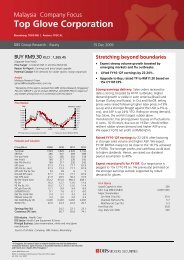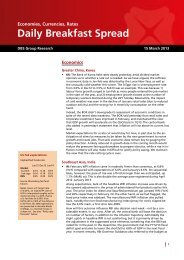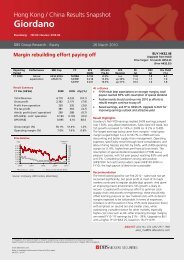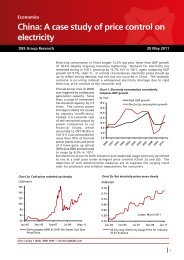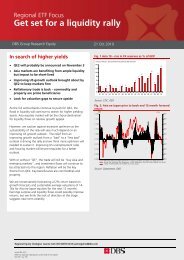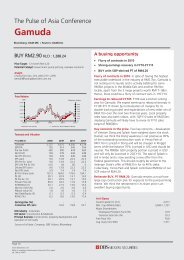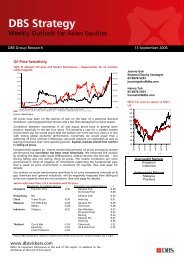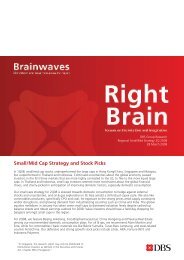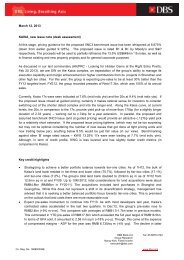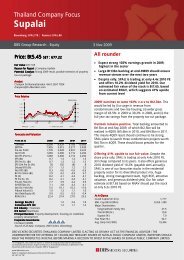Economics Markets Strategy - the DBS Vickers Securities Equities ...
Economics Markets Strategy - the DBS Vickers Securities Equities ...
Economics Markets Strategy - the DBS Vickers Securities Equities ...
You also want an ePaper? Increase the reach of your titles
YUMPU automatically turns print PDFs into web optimized ePapers that Google loves.
<strong>Economics</strong> – <strong>Markets</strong> – <strong>Strategy</strong><br />
<strong>Economics</strong><br />
this view, fall back pretty quickly with or without rate hikes. So <strong>the</strong> good<br />
news is, few would be required / delivered and <strong>the</strong> consequences for growth<br />
would be minor.<br />
But if you take <strong>the</strong> view, as we have, that higher oil prices are being driven by<br />
expanding demand, <strong>the</strong>n <strong>the</strong> policy prescription and <strong>the</strong> prognosis for growth<br />
changes. A greater number of interest rate hikes would be required to tame<br />
inflation. A greater hit to growth would result. How much growth a country<br />
has to sacrifice would depend on its preferences toward inflation.<br />
In Asia, inflation of 4%-8% has been <strong>the</strong> norm and <strong>the</strong> consequences to growth<br />
of maintaining that sort of rate are probably minor. After all, ex-food inflation<br />
in Asia is still running at only its 20-year average rate, even after a fivefold<br />
increase in oil prices since 2003. Yes, it will no doubt rise a little above <strong>the</strong> 20-<br />
year average in <strong>the</strong> coming year but that happens, by definition, exactly half<br />
<strong>the</strong> time anyway. Getting back to average in Asia will be a comparatively easy<br />
and low-cost exercise.<br />
Compared to what? Compared to <strong>the</strong> US and Europe. Their preferences toward<br />
inflation run on <strong>the</strong> order of 2%, not 4% to 8%. If <strong>the</strong>y want to get inflation<br />
down to 2%, <strong>the</strong>y will surely have to sacrifice considerably more in <strong>the</strong> way of<br />
growth.<br />
Why? Because, oil prices are no longer Made in America, or in Europe. They<br />
are made in Asia. Europe, Japan and <strong>the</strong> US all cut <strong>the</strong>ir oil consumption over<br />
<strong>the</strong> past two years. Europe and Japan have been cutting it every year for a<br />
decade. That hasn’t cut global demand. Or prevented oil prices from quintupling.<br />
Or prevented US and European inflation from going up.<br />
US and European central banks could raise interest rates and that would probably<br />
lower aggregate demand in <strong>the</strong> US and Europe. GDP growth too. Alas, unless<br />
<strong>the</strong> G3 went truly into recession, it would do little to curb Asia’s demand for<br />
oil.<br />
So we seem to have entered yet ano<strong>the</strong>r brave new world. A lot of that going<br />
around lately. Asia is driving things – important things like <strong>the</strong> price of oil, its<br />
own rate of GDP growth and, increasingly, aggregate global demand growth<br />
as well. Given <strong>the</strong>se structural changes, is it really any surprise that it would<br />
begin to dominate global inflation rates ei<strong>the</strong>r?<br />
G3 central banks and politicians in particular may not wish to accept an inflation<br />
rate determined by Asian preferences. But to <strong>the</strong> extent <strong>the</strong>y attempt to fight<br />
it, <strong>the</strong>y would only lower <strong>the</strong>ir (own) economic growth. Eventually of course<br />
<strong>the</strong>y would capitulate. How much growth <strong>the</strong>y sacrifice on an unwinable war<br />
is anyone’s guess. But <strong>the</strong> ECB and <strong>the</strong> Fed are ei<strong>the</strong>r “new” or under new<br />
leadership, or both, so <strong>the</strong> fight could be an ugly one.<br />
Perhaps it’s not such a clear day after all.<br />
Oil prices are<br />
driving inflation.<br />
But oil prices are<br />
not made in<br />
America or in<br />
Europe. They are<br />
made in Asia<br />
G3 central banks<br />
may have to accept<br />
an inflation rate<br />
made in Asia too.<br />
That or a<br />
permanently lower<br />
growth rate<br />
19



